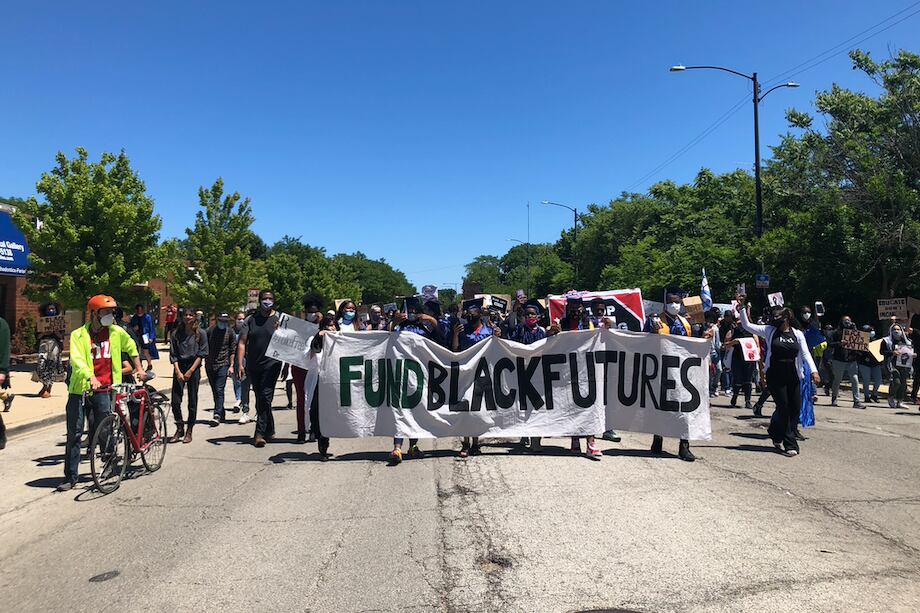For the first time in years, it looked like the movement to remove police officers from Chicago’s public schools was gaining momentum.
Following the lead of Minneapolis Public Schools, school districts across the country started calling hearings about school police, or school boards voted to remove officers altogether. National groups, like the Center for Popular Democracy, began working with local organizers to increase the national reach of their demands. And, in Chicago, city council members introduced an ordinance to end the $33 million contract between the school district and the police department.
But by Friday, the ordinance had stalled, and Mayor Lori Lightfoot had again said she would not end the school police program, instead leaving it to school councils to make the decision on a school-by-school basis.
“I don’t think it’s for me to usurp the authority of a local school council,” Lightfoot said during a press call Wednesday.
Organizers say they are not deterred. Maria Degillo, coordinator of Voices of Youth in Chicago Education, a group that has led some of the efforts, is no stranger to the long-haul challenges of making change in Chicago. VOYCE has won several victories in recent years - the organization played a critical role in the passage of two state laws that shifted school discipline: One in 2014 that requires all schools to provide data about suspensions and expulsions, and another in 2015 that limited school suspensions.
“We pride ourselves on being a learning organization - some things we are doing now might not necessarily work in the future or we might need to change,” Degillo, who began her organizing work as a high school student with VOYCE, said. “That’s just the way the world works.”
Even as school districts across the country have changed their relationships with police departments — from the Denver school board voting to phase out police last week to the superintendent in Oakland recommending an end to the school police program — there have been few concrete gains in Chicago.
VOYCE, with a coalition of others, has a two-pronged strategy to remove police officers from schools in Chicago. The first is to pass an ordinance through the city council. The second is to convince the Chicago Board of Education not to renew the one-year contract governing the school police program.
Efforts to pass an ordinance took a hit Wednesday when the chairman of the public safety committee sent the ordinance to the rules committee, where legislation tends to languish. Alderman Chris Taliaferro said he thinks some schools need police. “There is a specific need for police in some Chicago public schools,” he said.
Sponsors of the ordinance, working with Taliaferro, hope to call a hearing about the issue in July. “We are going to continue to push,” Carlos Rosa, sponsor of the ordinance whose ward includes part of Logan Square, said.
As part of their efforts, VOYCE will ask the school board Wednesday to end the contract between Chicago Public Schools and the police department. They also will recommend that principals be allowed to choose between having police officers or using the funding for social workers or restorative justice coordinators. Chicago board members either did not reply or declined to comment Friday.
The school board approved the most recent contract with the police department nearly a year ago.
“We don’t want the takeaway to be: Hire more social workers and call it a day,” Degillo said, noting VOYCE regularly holds youth-led meetings to build priorities around the needs of their student members.
Neither Degillo, nor other school police opponents, place much hope in change coming through the Local School Council system, which was given authority last summer to vote on having police officers in schools on a case-by-case basis.
Karen Zaccor, a teacher at Uplift Community High School in Uptown and an opponent of having police officers in schools, said she raised the issue with her council in recent weeks, and she expects they’ll discuss it this summer. Still, she said that with only one student seat on councils, students voices aren’t represented enough. “This issue impacts students and I think their voice should be loudest,” she said.
Other school communities, like Taft High School, in the Norwood Park neighborhood where many police officers live, are unlikely to see a push to remove officers.
Principal Mark Grishaber, interviewed earlier this year, said the role of officers in a school is only “1% to police a school, but 99% police PR.” That means positive interactions in a school that will pay dividends in the long run, he said.
“We have two great officers here at Taft, and I know they are doing a good job because I see kids talking to them all the time,” Grishaber, who appreciated that police were given a more clearly defined role this school year, said.
Looking ahead, Degillo said part of their challenge is that they want to not only change a policy but also shift the entire conversation around safety in schools.
“We are challenging the social norm of what it means to be safe,” she said.





